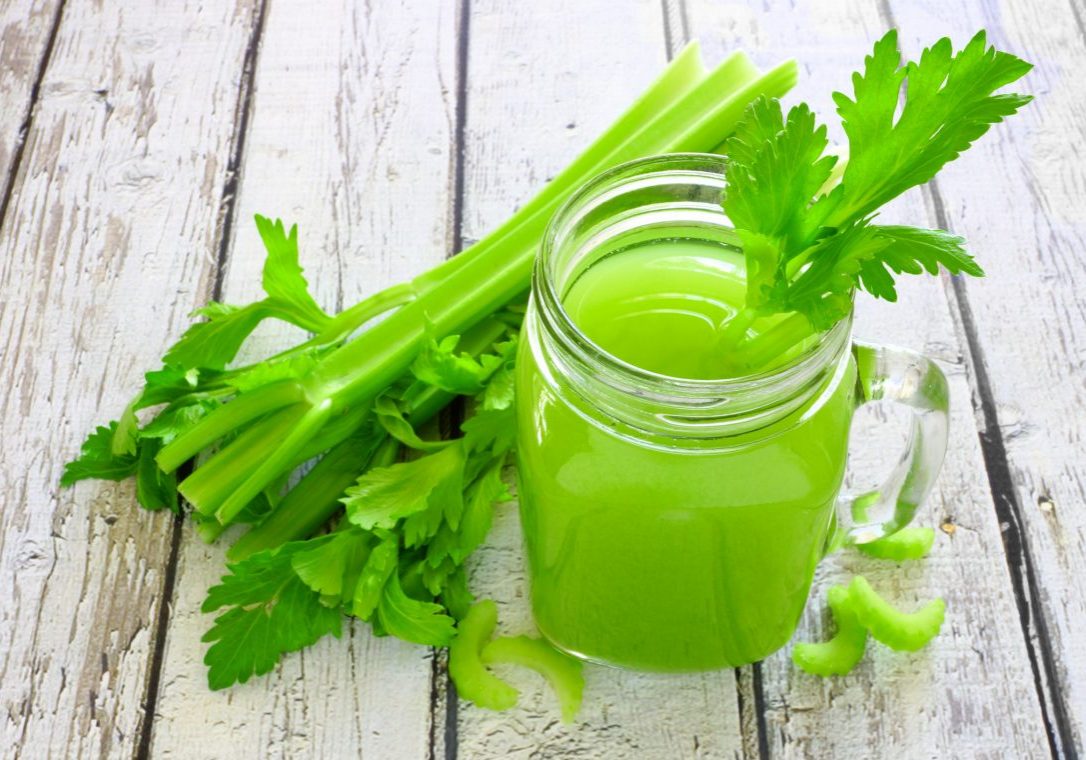The Shocking Benefits Of Celery You Need To Know About

When it comes to your health, chances are you’ve been told many times how you should be eating in order to achieve optimal health. One of the most common pieces of advice is to ‘eat your veggies.’ We all know that getting more fresh fruits and vegetables into our day is important for longevity, but…

When it comes to your health, chances are you’ve been told many times how you should be eating in order to achieve optimal health. One of the most common pieces of advice is to ‘eat your veggies.’
We all know that getting more fresh fruits and vegetables into our day is important for longevity, but do you know which ones to opt for?
You might have heard of the ‘superfoods’ such as kale, spinach, and broccoli. We always tend to lean toward these options. While there’s definitely nothing wrong with that, it is important to realize that there are other vegetable choices that also should get some attention.
The more variety you can get into your diet plan, especially when it comes to vegetables, the better off you’re going to be.
One vegetable in particular that very few people ever pay attention to is celery. When you think of celery, chances are you think ‘water’. Most people consider this vegetable primarily water and, thus, seriously lacking in nutrients.
And while it won’t stand up to providing as many antioxidants and nutrients as, say, kale will, there are some unique benefits of celery that should not go unnoticed. When added to your diet plan, you can reap these benefits and give yourself a change of pace.
Celery is also quite mild in flavor, so it’s something that will still help to add flavor to your foods without being too strong. For this reason, most people will like to include it in their daily diet plan.
So let’s walk you through some of these benefits of celery right now so that you can get a feel for what I’m referring to.
Nutritional Facts
Before we dive into the health benefits, let’s take a closer peek at the nutritional facts that celery has to offer. Per one cup of raw, chopped celery, you’ll take in:
· 16 calories
· 3.5 grams of carbohydrates
· 0.7 grams of protein
· 0.2 grams of fat
· 1.6 grams of fiber
· 37% of your daily value for vitamin K
· 9% of your daily value for vitamin A
· 9% of your daily value for folate
· 8% of your daily value for potassium
· 3.1% of your daily value for vitamin C
Also, in celery, you’ll find very small amounts of nutrients like vitamin E, niacin, and iron, as well as zinc and selenium.
Weight Loss

The first key benefit you can expect to receive from having celery in your diet plan is assistance with weight loss. At just 16 calories per cup of celery, it’s no secret this is one seriously low-calorie food.
In fact, if there was ever a negative calorie food (meaning you burn off more calories simply digesting it than you do from the food itself), celery would be it. Granted, there are really no negative-calorie foods per se, but celery does come very close.
The fact you do get so much volume for so few calories, however, means you’ll be adding a lot of bulk to your meal, which will help keep you feeling fuller. Often the biggest reason people fail on their weight loss diet plan is due to hunger and eating such small meals all the time. So to be able to sit down to more food is often a relief – even if the food does only contain a few calories.
Reduced Cholesterol Level
If you are someone who’s attempting to lower your cholesterol level, that’s yet another reason to add celery to your diet plan. Celery contains a compound called 3-n-butylphthalide, which may help to lower the total level of lipids in the body and help to improve your overall cholesterol profile and, therefore, the risk of heart disease.
Research1 had shown that when animal test subjects were fed a high-fat diet but also given celery extract with it, they didn’t see as high of an increase in total blood lipids as the animals that went without the celery extract.
Consider it a natural treatment to help combat heart disease.
Reduced Inflammation

Inflammation is something that many people are suffering from today and is at the heart of so many diseases and conditions. Most people don’t realize they have low-grade inflammation present in their body all the time until some sort of condition resulting from it appears.
Inflammation can lead to things such as cancer, heart disease, arthritis, as well as irritable bowel syndrome, and urinary tract infections. This list is not exhaustive by any means, but hopefully, this demonstrates to you just how serious inflammation can be.
Celery is going to provide you with antioxidants and polysaccharides that help to serve as an anti-inflammatory in the body, reducing inflammation and fighting off these conditions.
Combats High Blood Pressure
In alignment with reducing cholesterol, which can lower your risk factor for heart disease, you’ll also notice a decline in blood pressure as well if you’re regularly including celery in your diet plan.
Having high blood pressure levels certainly increases your risk for coronary heart disease so all you can do to lower it is going to benefit you in the long-term.
When celery is included in the diet, it’s often seen that blood pressure will decrease and circulation will be enhanced at the same time.
With both of these taking place, your risk of heart disease and stroke will be significantly lowered. If either of these conditions runs in your family, that’s definitely a reason to consider eating more celery whenever you can.
Reduced Risk Of Ulcers

Are you someone who often experiences ulcers? If so, you know just how painful these can be. All it takes is one occurrence of an ulcer to make you never want to suffer down that path again.
Ulcers can be the result of many things – the foods you’re eating, coupled with ongoing stress in your day-to-day life. The good news is that there is a certain type of extract found in celery that can help to provide protection to the lining of the digestive tract, making it less likely that you’ll suffer from an ulcer.
Celery is also helpful for controlling the level of gastric acid that’s produced and therefore helps to relieve the stress and strain placed on the stomach because of this.2
It’s also worthwhile to note that taking a high quality probiotic can help support a healthy digestive tract and improve your immune strength function. Which, in turn, can lead to reduced occurrences of ulcers as well.
Protects Liver Health
Your liver works hard each and every day, day in and day out, detoxifying your system and making sure everything is running smoothly. Many people don’t realize just how toxic the liver can get if care is not taken and preventative actions are carried out. Fatty liver disease, for instance, is not that rare; when you have it, it can be very detrimental to your overall health.
The good news, however, is that if you are already suffering from fatty liver disease or are on the verge of doing so, celery might be able to offer some relief.
Research has demonstrated that when test subjects consume celery, chicory, and barley powder, they could note an increase in the overall level of liver enzymes present in the body and a reduced level of blood lipids3.
The end result?
A healthier liver and a better detoxification system.
Improved Digestion And Reduced Bloating

Do you often feel bloated after a meal? Are you walking around feeling like you’re a few pounds heavier than you are just because your stomach is puffed out?
If so, eating celery might be able to help. Celery will actually act as a diuretic in the body, so it can help you shed any extra water weight you may be carrying. As anyone who’s ever suffered from water weight gain knows, it is not only frustrating but can be downright uncomfortable as well.
Celery is often used as a natural diuretic for those who need to get rid of edema in the body, as it’s a lot safer to use than over-the-counter diuretics.
In addition to that, celery will also help improve your overall level of digestion, so if you take it along with an effective digestive enzymes product, you’ll be setting yourself up for optimal digestion.
May Help Fight Infections
As it turns out, celery may have medical benefits as well. If you’re suffering from an infection, you might want to include a few stalks of celery in your diet over the next few days, as this could be key in fighting off that infection and getting better.
Research has shown that celery contains a special type of antimicrobial component, which can help to reduce the speed at which bacteria are able to multiply and spread. The result is that you get over that infection faster than you would otherwise.
Hydration

Another benefit that’s often overlooked completely is that of hydration. Because celery does contain so much water, whenever you eat it, you’re actually going to be giving your overall level of hydration a boost.
For those who struggle to get their eight glasses of water per day, adding more fresh fruits and vegetables to your diet can help get you there without having to slam back all those bottles of water.
Options such as celery, cucumber, and watermelon, for instance, are all full of water and, therefore, will help you get those needs met more efficiently.
Reduced Risk Of Urinary Tract Infections
UTIs are definitely an unpleasant issue that some of us end up dealing with, but when we do, it’s helpful to have a go-to treatment in place.
While there are many over-the-counter remedies to help combat the pain and discomfort of UTIs and help them heal faster, did you know that celery is a natural treatment method? Simply adding more celery to your diet, whether you’re suffering or just looking to prevent one in the first place, can help slash your risk of a UTI dramatically.
In addition to combating urinary tract infections, the celery you consume may also work towards helping to decrease your risk of kidney problems down the road as well as help lower the risk for cysts within your reproductive system.
So hopefully, now you can see just how very helpful celery can be to your body. Too many people completely disregard this vegetable because they think it’s all just water and there’s no point in consuming it unless the recipe calls for it. It pays, however, to find ways to incorporate it into your diet plan, even if the recipe doesn’t call for it.
Below are a few serving suggestions for celery as well as a couple of recipes that will help you make use of this powerful vegetable.
· Serve a couple of stalks, cut into half in the middle, and then stuffed with peanut butter or hazelnut spread
· Blend celery stalks into a fruit smoothie to get your vegetable fix
· Add celery stalks to any broth-based soup you’re preparing. They work great in any soup recipe
· Toss sliced celery stocks into a salad you’re preparing
· Stir-fry celery stalks along with mushrooms and onions and have it alongside your main course meal
· Add them to tacos. An unexpected addition, celery can add some delicious crunch and make this meal more enjoyable.
· Use them when making a stew. Celery adds a nice subtle flavor that you’ll appreciate in this dish.
· Make salsa with them and other ingredients. It can be an incredibly refreshing side of your main course meal.
If you get creative, chances are good. You can think of at least a few additional ways to get celery into your diet plan. Furthermore, here are a couple of recipes to try out.
Braised Celery
Perfect for serving on the side of your main course meal, make this one with grass-fed butter to keep things healthy.
12 stocks of celery
2 tbsp. grass-fed butter
, salt and pepper to taste
¾ cup bone broth
Was the celery, and then remove the stem and any leaves. Cut the celery into small diagonal chunks and then proceed to melt the butter in a heavy skillet.
Add the celery, salt, and pepper, and then sauté for 5 minutes or until the celery has begun to soften.
Add the bone broth, and then bring the whole mixture to a simmer. Cook for about 5 minutes, stirring occasionally to let the celery soften. Remove the lid and then cook for another few minutes until the liquid has evaporated.
Chicken Celery Thai Salad
This chicken Thai salad is a unique salad that’ll change up your diet while keeping it healthy. This salad is naturally lower in carbs and higher in protein with a modest amount of fat, but feel free to add some additional ingredients if you want to boost the fat content. Ramen noodles work well, as does dried cranberries, if you want to add a sweet taste to this dish.
3 tbsp. olive oil
2 tbsp. fresh lime juice
2 tsp. fish sauce
1 garlic, finely minced
6 stalks of celery, thinly sliced
3 green onions, thinly sliced
1 cup cilantro leaves
¼ cup roasted peanuts
Stir together the oil, lime juice, as well as fish sauce. In a large bowl, combine the celery, scallions, cilantro, and peanuts. Drizzle dressing over the top, toss, and then serve.
References:
- Tsi, D., N. P. Das, and B. K. H. Tan. “Effects of aqueous celery (Apium graveolens) extract on lipid parameters of rats fed a high-fat diet.” Planta medica 61.01 (1995): 18-21.
- Al-Howiriny, Tawfeq, et al. “Gastric antiulcer, antisecretory and cytoprotective properties of celery (Apium graveolens) in rats.” Pharmaceutical biology 48.7 (2010): 786-793.
- El-Mageed, Nehal M. Abd. “Hepatoprotective effect of feeding celery leaves mixed with chicory leaves and barley grains to hypercholesterolemic rats.” Pharmacognosy magazine 7.26 (2011): 151.
8 Comments
Leave a Comment
You must be logged in to post a comment.





Very informative and uplifting. Learned quite a lot about the benefits of celery,
Hello Vincent,
My name is Ann-Marie, and I am a Happy Health Concierge here at BiOptimizers!
We are glad we were able to share and so pleased that you found the information helpful.
If you have any questions, please email us at [email protected]
Take care and have a nice day!
My very best regards,
Ann-Marie
Happy Health Concierge
BiOptimizers
Very interesting article. I’m surprised you didn’t offer a cream of celery soup recipe though.
Also your chicken salad celery recipe forgot to list the chicken in both the ingredients and the instructions.
Hello Karen,
My name is Ann-Marie, and I am a Happy Health Concierge here at BiOptimizers!
We are happy to know that you found interest in the article. We appreciate you taking time out to leave us your valuable feedback. I’ll pass your feedback on to the relevant department.
If you have any questions, please email us at [email protected]
Take care and have a nice day!
My very best regards,
Ann-Marie
Happy Health Concierge
BiOptimizers
I love celery and pimento cheese! Love all the information here.I would like to know are beets a great choice for health?
Hello Diane,
My name is Ann-Marie, and I am a Happy Health Concierge here at BiOptimizers!
We are happy to know that you found the information helpful. Beets are loaded with vitamins and minerals yet low in calories and fat. They’re also a good source of several key nutrients, including folate, manganese, and copper.
If you have any questions, please email us at [email protected]
Take care and have a nice day!
My very best regards,
Ann-Marie
Happy Health Concierge
BiOptimizers
Cant’t wait to getting back to eating more celery,great benefits,especially since I am in remremission for cancer times 2.
We wish you the best!